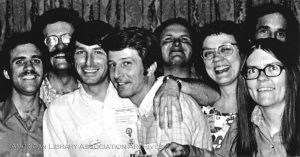
The month of June, otherwise known as Pride Month, is a time for us to celebrate the accomplishments, beauty, strength, and resilience of the LGBTQ community. Every year a different theme is taken on to help acknowledge all the work this community has done, with this year's theme being “Reflect. Empower. Unite”. Oftentimes as librarians, we like to reflect upon the work we have done as an institution for society by asking, “What positive impact has the library had on queer people?”. All in all, it can be said that the library provides a safe space, offers important materials, resources, and representation, hosts queer-based events, and more. Keeping all of this in mind, I find the library's ability to organize and build community to be one of its greatest strengths in regards to supporting LGBTQ people and materials. The best example of this is in the creation of “The Task Force on Gay Liberation.”
The  Task Force on Gay Liberation was founded in the 1970s and is recognized for being one of the very first professional organizations in the U.S that was formally organized to protect the rights and promote awareness of gay and lesbian people. The creation of this group is credited to Janet Cooper and Israel Fisherman after meeting in 1970 at the ALA Conference in Detroit at the Social Responsibilities Round Table Session. During this meeting they found themselves looking for more representation and support for the gay community, which eventually turned into them becoming that source of support. As the organization grew their goals expanded to include the creation of bibliographies, revision of library classification schemes and subject headings, building and improving access to collections, and fighting job discrimination. Alongside this, the group continued to evolve by extending their protection and promotion of gay liberation to those who are Bisexual and Trans as well.
Task Force on Gay Liberation was founded in the 1970s and is recognized for being one of the very first professional organizations in the U.S that was formally organized to protect the rights and promote awareness of gay and lesbian people. The creation of this group is credited to Janet Cooper and Israel Fisherman after meeting in 1970 at the ALA Conference in Detroit at the Social Responsibilities Round Table Session. During this meeting they found themselves looking for more representation and support for the gay community, which eventually turned into them becoming that source of support. As the organization grew their goals expanded to include the creation of bibliographies, revision of library classification schemes and subject headings, building and improving access to collections, and fighting job discrimination. Alongside this, the group continued to evolve by extending their protection and promotion of gay liberation to those who are Bisexual and Trans as well.
Iconic political figures such as Barbara Gittings, who was the second coordinator of the Gay Liberation Task Force in 1972, worked alongside Frank Kameny to contribute to the elimination of homosexuality as a mental disorder from the DSM in 1972. This in turn influenced the cataloging and classification practices for gay subjects and allowed for more nuanced narratives and perspectives to be held within the library. Gittings is also known for compiling the first Gay Bibliography, a list of gay-positive books and information resources. While her intentions were primarily to improve patron access to gay information and materials that have a positive view on homosexuality, it had a long-lasting impact on cataloging overall. The impact the Task Force had on librarianship only continued through Sanford Berman’s guidance in advising them to revise gay and lesbian subject headings and classifications. The actions that the Task Force took after this advic e was given led to new ground being broken as a movement to democratize subject cataloging practices began and continues to influence present-day cataloging practices.
e was given led to new ground being broken as a movement to democratize subject cataloging practices began and continues to influence present-day cataloging practices.
Today, The Task Force on Gay Liberation is now known as, the Rainbow Round Table (RRT). They are formally considered to be a part of the American Library Association and are fully committed to serving the information needs of the LGBTQIA+ professional library community, as well as the LGBTQIA+ information and access needs of individuals at large. They are dedicated to encouraging and supporting free and necessary access to all information, as reflected by the missions of the American Library Association. In addition to this, they provide awards, grants, and scholarships to those who create and provide aid in the development of queer works, studies, programs, initiatives, and so on that support the needs of the LGBTQ community. They are also known for hosting the Stonewall Books Awards which honors books of exceptional merit in the covering of LGBTQIA+ experiences.
During this month, it is important to remember that it is the people and the community we build around us that truly brings about the change we need. Acceptance is not easily won, and we must continue to actively fight for the rights of all people regardless of their sexual orientation, gender expression, personal identity, and otherwise. Alongside this, it is of equal importance to celebrate the wins of the LGBTQ community, which is why I am happy to say that for the first time ever, the Rebecca Crown Library is proudly displaying a wide range of Pride flags to celebrate the month of July.

Work Cited
American Library Association. (n.d.). Rainbow Round Table (RRT). https://www.ala.org/rrt
Brewer, S. (2018, June 5). Out of the closet & onto the shelves: Librarians and the oldest gay professional organization in the U.S. – American Library Association Archives – U of I Library. https://www.library.illinois.edu/ala/2018/06/05/out-of-the-closet-onto-the-shelves/
The fight for positive and accurate LGBT information in Librarie. (n.d.). https://about.proquest.com/en/blog/2016/The-Fight-for-Positive-and-Accurate-LGBT-Information-in-Libraries/
